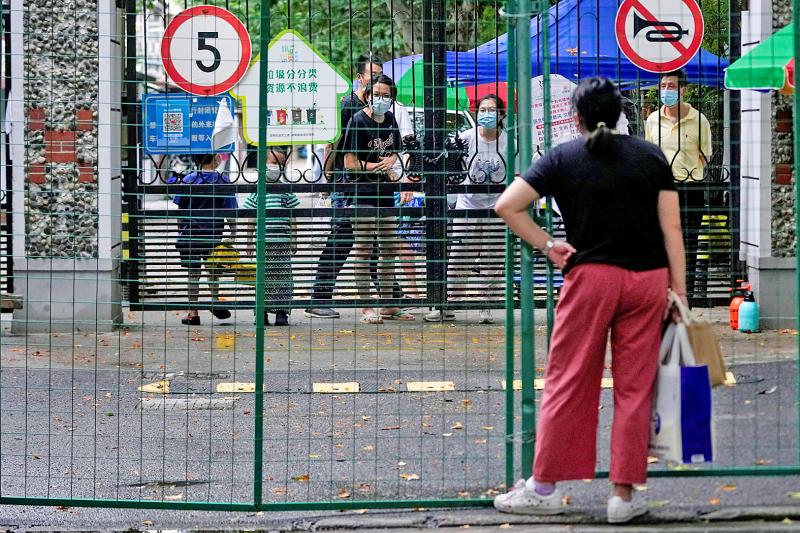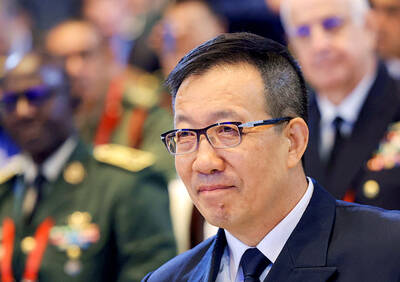China yesterday reported zero new COVID-19 infections in Shanghai for the first time since March, as the country’s latest outbreak subsides after months of virus-spurred lockdowns and restrictions.
China is the last major economy still committed to a “zero COVID-19” strategy, stamping out new cases with a combination of targeted lockdowns, mass testing and lengthy quarantines.
The economic hub of Shanghai was forced into a months-long lockdown during a COVID-19 surge this spring driven by the fast-spreading Omicron variant, while the capital Beijing shuttered schools and offices for weeks over a separate outbreak.

Photo: Reuters
Infections narrowed to a trickle over the past few days, with Shanghai yesterday reporting zero locally transmitted cases for the first time since the start of the outbreak in early March.
“There were no new domestic COVID-19 confirmed cases and no new domestic asymptomatic infections in Shanghai on June 24, 2022,” the city said in a statement.
The lockdown on Shanghai’s 25 million residents was virtually lifted early this month, but the metropolis has struggled to return to normal as individual neighborhoods have reimposed restrictions in response to new infections.
Millions of people in the city were temporarily locked down again two weeks ago, after the government ordered a new mass testing campaign.
In Beijing, restrictions first imposed last month were eased as cases declined, but tightened again this month after a nightlife-linked infection cluster emerged.
After days of mass testing and localized lockdowns, the “Heaven Supermarket infection chain” — named for the popular bar visited by people who caught the virus — has been effectively blocked, Beijing authorities said last week.
The Beijing Municipal Education Commission yesterday said that all elementary and middle school students could return to their classrooms for in-person schooling tomorrow, after the bar cluster delayed school reopenings.
All school staff, students and parents must take a COVID-19 polymerase chain reaction test before returning to school, and are urged to “limit going out and avoid gatherings,” the commission wrote online.
Beijing reported two new local infections yesterday.
China insists its “zero COVID-19” policy is necessary to prevent a healthcare calamity, with officials pointing to unevenly distributed medical resources and low vaccination rates among older people as major concerns.
The strategy has hammered the world’s second-largest economy and heavy-handed enforcement also triggered rare protests, while the extreme isolation of foreign businesses and middle-class families has tipped them into making exit plans.

DEADLOCK: Putin has vowed to continue fighting unless Ukraine cedes more land, while talks have been paused with no immediate results expected, the Kremlin said Russia on Friday said that peace talks with Kyiv were on “pause” as Ukrainian President Volodymyr Zelenskiy warned that Russian President Vladimir Putin still wanted to capture the whole of Ukraine. Meanwhile, US President Donald Trump said that he was running out of patience with Putin, and the NATO alliance said it would bolster its eastern front after Russian drones were shot down in Polish airspace this week. The latest blow to faltering diplomacy came as Russia’s army staged major military drills with its key ally Belarus. Despite Trump forcing the warring sides to hold direct talks and hosting Putin in Alaska, there

North Korea has executed people for watching or distributing foreign television shows, including popular South Korean dramas, as part of an intensifying crackdown on personal freedoms, a UN human rights report said on Friday. Surveillance has grown more pervasive since 2014 with the help of new technologies, while punishments have become harsher — including the introduction of the death penalty for offences such as sharing foreign TV dramas, the report said. The curbs make North Korea the most restrictive country in the world, said the 14-page UN report, which was based on interviews with more than 300 witnesses and victims who had

COMFORT WOMEN CLASH: Japan has strongly rejected South Korean court rulings ordering the government to provide reparations to Korean victims of sexual slavery The Japanese government yesterday defended its stance on wartime sexual slavery and described South Korean court rulings ordering Japanese compensation as violations of international law, after UN investigators criticized Tokyo for failing to ensure truth-finding and reparations for the victims. In its own response to UN human rights rapporteurs, South Korea called on Japan to “squarely face up to our painful history” and cited how Tokyo’s refusal to comply with court orders have denied the victims payment. The statements underscored how the two Asian US allies still hold key differences on the issue, even as they pause their on-and-off disputes over historical

BEIJING FORUM: ‘So-called freedom of navigation advocated by certain countries outside the region challenges the norms of international relations,’ the minister said Chinese Minister of National Defense Dong Jun (董軍) yesterday denounced “hegemonic logic and acts of bullying” during remarks at a Beijing forum that were full of thinly veiled references to the US. Organizers said that about 1,800 representatives from 100 countries, including political, military and academic leaders, were in Beijing for the Xiangshan Forum. The three-day event comes as China presents itself as a mediator of fraught global issues including the wars in Ukraine and Gaza. Addressing attendees at the opening ceremony, Dong warned of “new threats and challenges” now facing world peace. “While the themes of the times — peace and development —